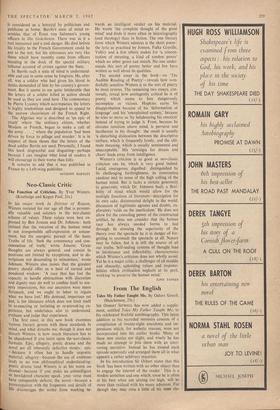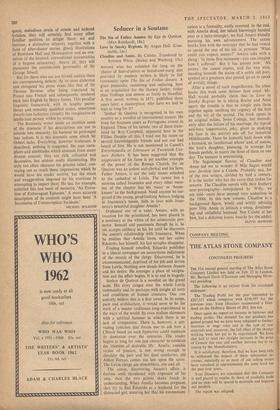From The English
Tales My Father Taught Me. By Osbert Sitwell. (Hutchinson, 25s.) SIR OSBERT SITWELL has now added a supple- ment, entitled Tales My Father Taught Me, to his celebrated fivefold autobiography. This latest addition to his recorded memoirs consists of a compilation of twenty-eight anecdotes and im- pressions which, for aesthetic reasons, were not incorporated into his earlier books. Many of these new stories are slight, and wisely he has made no attempt to join them with an inter- vening narrative. Instead he has treated each episode separately and arranged them all in what appears a rather arbitrary sequence.
In his introduction Sir Osbert states that this book 'has been written with no other object than to engage the interest of the reader.' This is a modest ambition and one which, since he is often at his best when not aiming too high, will be more than realised with his many admirers. For though they may miss a little of his most elo- quent, melodious strain of ornate and ordered lyricism, they will certainly find many other familiar qualities to delight them; wit and humour, a distinctive urbanity together with a fund of after-dinner stories, glossy illustrations of Renishaw Hall and Montegutoni and an evo- cation of the leisured, conventional eccentricities Of a bygone aristocracy. Above all, they will encounter the considerable personality of Sir George Sitwell.
But for those who are not Sitwell addicts there are corresponding defects. At its most elaborate and elongated his prose reads like that of Sir Thomas Browne, after being translated by Proust into French and subsequently rendered back into English by Henry James. This peculiar linguistic framework, with its lengthy paren- theses and remotely qualified asides, sometimes dwarfs into ludicrous triviality the imaginative or intellectual picture within its setting.
The Romantic writer needs an intuitive sense of the dramatic if his descriptions are not to subside into obscurity, his humour be prolonged into tedium. It is this dramatic sense which Sir Osbert lacks. Everything, however irrelevant, is described; nothing is suggested. He uses meta- phors and similitudes which emanate from many diverse sources; they are rich, colourful and decorative, but seldom really illuminating. His style too often obscures his genuine talent, con- veying not so much those impressions which he would have his reader receive, but the strain and exaggeration imposed by his exertions in attempting to impart them. He has, for example, subtitled this last book of memoirs, `An Evoca- tion of Extravagant Episodes.' A more accurate description of its contents might have been 'A Succession of Commonplace Incidents.'
MICHAEL HOLROYD



































 Previous page
Previous page